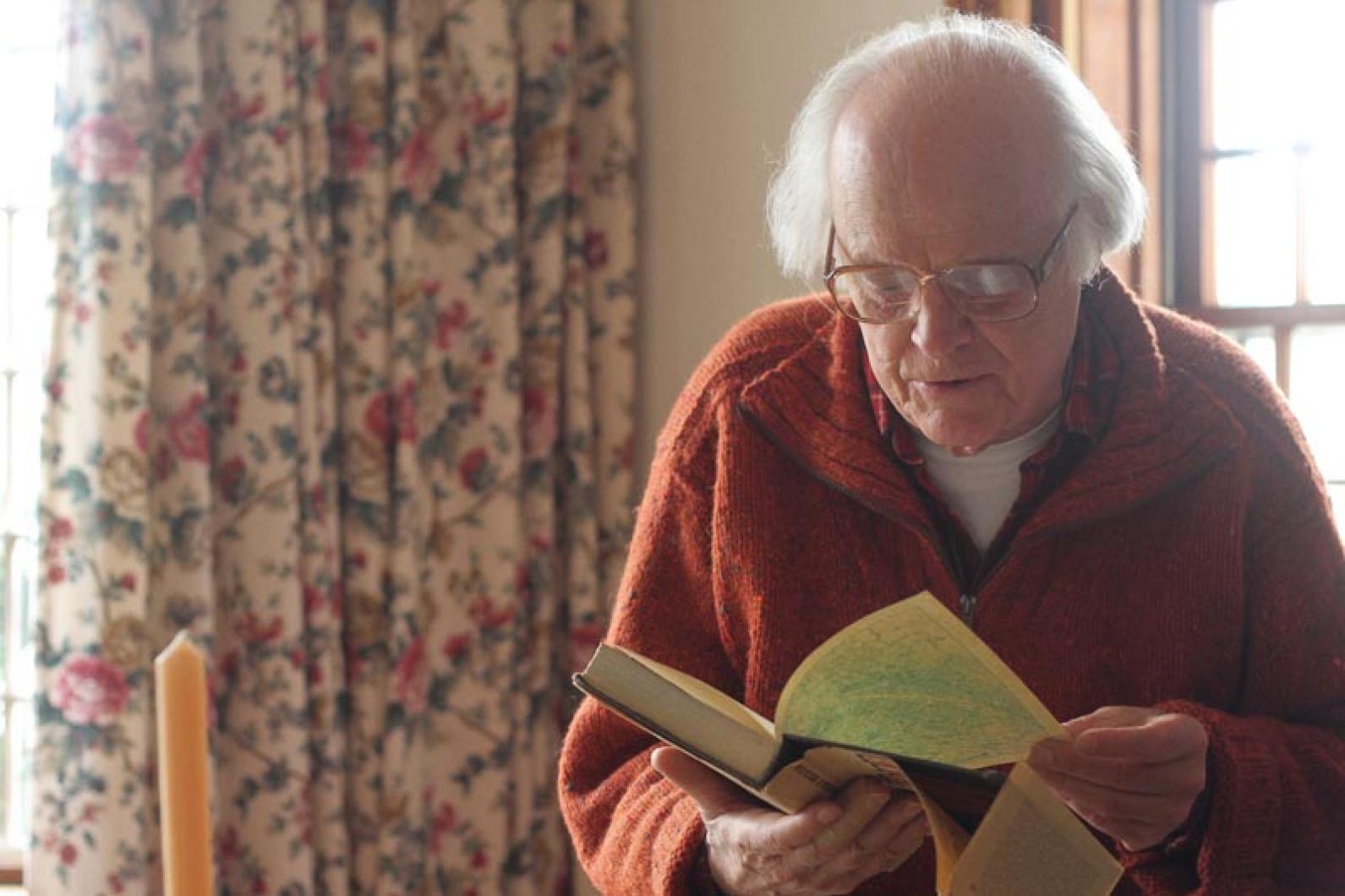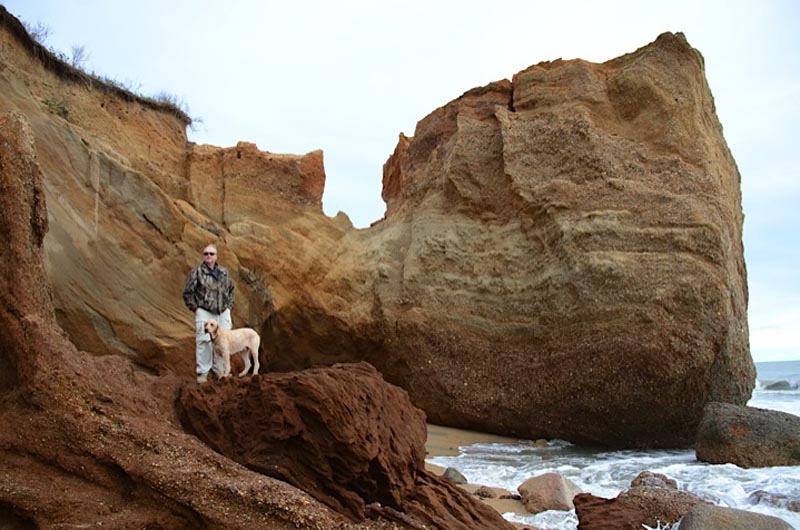On Wednesday, Nov. 14, at 7 p.m. Edward Hoagland will speak at the Vineyard Haven Public Library about his 60 years of writing. Mr. Hoagland lives for most of the year in Edgartown and is one of the nation’s most celebrated essayists. He has written more than 20 books, both fiction and nonfiction, received two Guggenheim Fellowships, and was elected to the American Academy of Arts and Letters in 1982 and to the American Academy of Arts and Sciences in 2011. His 2011 book, Sex and the River Styx, won the John Burroughs Medal. His latest book is Alaskan Travels.
What follows is a piece Mr. Hoagland recently submitted to the Gazette.
Snapping a zillion digital photos as our eyes adjust to looking at things close in on a screen, we hardly glance at the clouds on an ordinary day yet are told the jet stream is changing, the ocean acidifying, Amazonia being chopped down for ethanol, beef and eucalyptus plantations, and fish vacuumed industrially for cat food and omega oil toward the point where stocks may crash. Weather, forecast hourly, we thought was conquered with manipulated seeds and leveed irrigation, supertankers and container ships.
It’s a question of what matters. Emphysema blowing over from China will, and diabetes multiplying with prosperity there. But, blog-absorbed, will we notice the disappearance of reams of songbirds? Crows and gulls, both barking, black and white, will still scavenge our garbage and the bird feeder out the window will attract supplicants, but might the loss of half of life’s diversity, or at least its species, provoke an undertow of unease in ours. A riptide of cumulative sadness — conquerors remorse — that being able to summon Bogie and Hepburn, for instance to a cell phone screen, may not make up for. Gene Kelly singin’ in the rain — we’ll have too much rain or a drought. Culinary schools will specialize in restoring taste to corn and tomatoes or pretending tilapia aren’t raised in metal bins. Will we want to know our children’s likely life spans at birth? And for religion, whose universal precept is charity — the beggars on the steps of a cathedral or mosque — YouTube will pose a whopping challenge. Famine in the living rooms of countries with high fences and hoarded food. This is not the missionary who reports back to your church, where a collection plate is passed, once a year. Gated communities and provincial cities alike will need to choose to witness infernal malnutrition and childhood mortality halfway around the globe, or not. While Bangladesh drowns, will it distract us from the Mcmansion complaints of millionaires who find surf lapping underneath their beach house decks.
Creation is being altered, and where will our leadershop come from? I heard John XXIII, Martin Luther King and Billy Graham preach in their day, but suspect that if they reached the nitty-gritty, they’d be undermined, as King was and ultimately John by later hierarchies. The bully pulpit of the presidency is usually occupied by “people people” for obvious reasons and Barack Obama, no exception, took a month to respond in his gut to the devastation of the Gulf Oil spill, if he ever really did. Our pervasive pessimism, however, must be addressed. Both civility and iron-and-concrete infrastructure are unraveling, like the economy, banking, and the commonalities of entertainment and family bonds. In 70 years of paying attention, I can’t recall such dispiritedness. We’ve gone gimpy from our twin arrogances of debt and bellicosity, which fed our pride and seemed to lubricate our market economy while actually eating holes in it. It’s not the unwinding of patriotism or absence of fun with the latest Apple gizmos, but the disconnect. Where are we working, with high unemployment, or why, when technology strides past wherever you are with seven-league boots? Smoke and mirrors, dickering gridlock in the capitals — fly to another one if you don’t like ours. Participatory democracy isn’t working well in these new climes, and we will need it to. Hives have queen bees, not Brownian motion, and, sealed in individual capsules of enthusiasm as many people nowadays are, earbuds tuned to canned selections of sound, eyes fixed on gamesmanship or reruns two feet away, that’s where we seem headed.
The industrial revolution was like a meteor strike or volcanic explosion in paleontological time that caused a great die-off, yet we know the earth recovers. The energies of life dodge round the destruction. For a naturalist, it’s like watching the cathedrals of Chartres or Notre Dame razed: unspeakable, but you would realize that God is everywhere and does rebound. Being ignored in the Information Age may be better for the outdoors than the triumphalism of conquest that was the rage before. I remember when fuminess signified prosperity, driving into Pittsburgh, glowing red at night, and other brawny cities. Now you sniff the smell in China, and even in Africa it’s harder to hear lions tom-tom-ing on the veldt. The Other, in other words. We don’t seem to want an Other any more, just as cuddlies in a playroom. Photosynthesis won’t cease, no matter how much we demolish, and there will be anthills smaller than ours. We’re worried about the messaging in our own, however, because it’s atomized. Phone calls are screened, emails erased unread, lest discordancies reach our minds. “The vision thing,” as one of our recent humdrum presidents put it, is not in evidence to coalesce attention around any plans or action. “Apps” for our devices are mostly designed to further individual isolation or automated for wholesale categorizing. How long can the conveniences last?
Windmills turn. That will help. I’ve seen famine in Africa and the bravery of the Maryknolls; in fact 50 years ago saw Sicilians eating cats, so things can turn around. But our altruism usually worked, beyond soup kitchens and food pantries, on the basis of trusting the weather — a grounding in the belief that if you planted, you ate. Life by the sea and the tides were eternal, with fish schooling immemorially, birds whirling south or north by the billion in concert with autumn leaves, spring flowers. Wars were infernal, manmade, but there was a baseline of brooks veining into creeks feeding lakes, and the sea’s spindrift, as water yo-yo’d up and down dependably. The surf thumped, rabbits thumped, grouse drummed, whales talked a bit like porcupines, winds harrowed the weaker trees once or twice a year, opening sky space for reforestation, as fires did. But neither wildfires nor tornado-alley tumult were as relentless in historic memory. The trees and sea symphonize worldwide with a resonance living beings from butterflies to dolphins may respond to — the forests a tuning fork, the seas a bass section underlying all surface solos. I infer this from intuition joined with common sense, the way people knew cigarettes were “coffin nails” and “an apple a day keeps the doctor away” a century before science confirmed it. Our tears, blood and temperaments are salty, like the ocean, and we loll in water to truly relax. In gyms we jog like hunter-gatherers as best we can, but our peripheral vision and hearing suffer from disuse; mainly we look at screens at arm’s length, with sound levels tuned to lazy-ease. The screen saver might picture a panoramic landscape for tranquilizing purposes, although of course a real landscape is animating — I’ve fingered a jaguar’s pugs in Belize and followed a grizzly in British Columbia so closely that muddy water was still filling his tracks; no hedge-fund trader could have been more alert. Scentlessness is another aim we strive for with deodorants, manufactured colognes and so forth, anything not to know how our friends and acquaintances actually smell. Our noses may become mere relics like a coccyx or a dewclaw from being relegated to bony status. Once again, I remember learning what a nose is for on a forest trail, this time in India, at night, afoot, when I sniffed carrion and realized I was close to where probably a tiger was crouched. Could be a leopard or a bear, but without quibbling I beat a retreat. We’ve killed those guys, but our narrowing focus is not without a price. A tunneling of context toward Jimmy Stewart, poker or porn, a splintering of coherent traditions of church and state. Loneliness or lawlessness may increase or decrease because of social media — in due course we’ll see — but the larger shift to cyberspace from real-time space is the seismic gamble. Underfoot lies our planet. Can we divorce it?
We light our lives so brightly and constantly we’ve lost the delicacies of dusk. Nor do most of us know what phase of the moon we’re in or what time the sun rises this week or the prismatics of the sunset.
Does it matter that we don’t notice the shapes and luminescence of the clouds any more? Like wiping out a third of the earth’s species, it’s a bit too soon to calculate the consequences; they interrelate. I can recharge with Mozart, a baseball channel or whatever, but feel a narrower column of refreshment than when I’m out of doors dangling my legs in a mossy brook’s waterfall, watching shrews nest under a log.
So little barefoot time, with tree frog song and being dogs with our dogs or supine as a lizard on a rock. Will it unstring us when all the turtles have been squashed under tires and Amazonia is a eucalyptus plantation and Africa overwhelmingly human in nature? How much can we shed? Will we still hum to vent the animal in us, give our children teddy bears, envy birds their wings, and lick a finger to hold up and measure the wind? Will we say, “Your color’s good,” or “Why the tears” again?






Comments
Comment policy »